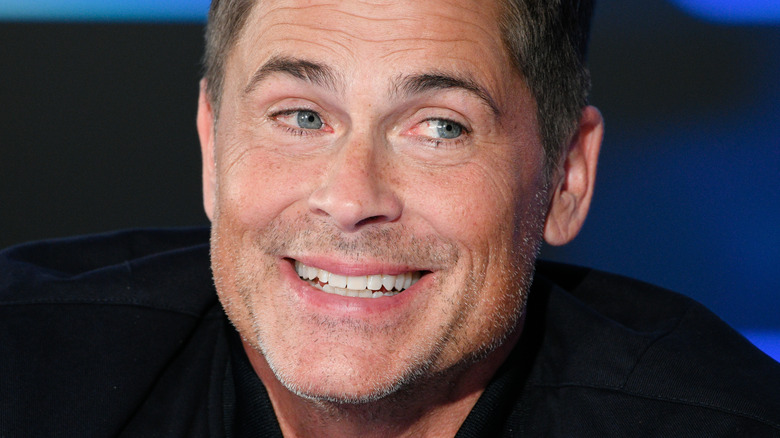According to Rob Lowe, he gets "an embarrassing amount" of sleep.
"I get tons of sleep," Lowe told USA TODAY in an interview published Tuesday, but he declined to provide an exact amount. "I don't want people to think there is something wrong with me." It's a lot more than 12 hours of sleep. But if 12 [hours] are available, I'll take it."
Between job commitments, the actor, 59, often sleeps in his SUV, reclining his seat all the way back for extra comfort.
According to Rob Lowe, he gets "an embarrassing amount" of sleep.
"I get tons of sleep," Lowe told USA TODAY in an interview published Tuesday, but he declined to provide an exact amount. "I don't want people to think there is something wrong with me." It's a lot more than 12 hours of sleep. But if 12 [hours] are available, I'll take it."
Between job commitments, the actor, 59, often sleeps in his SUV, reclining his seat all the way back for extra comfort.
"I have it down to a science," said Lowe. "The eye mask, the noise-cancelling headphones from Bose." And now I'm gone."
Lowe is the latest celebrity to reveal personal sleeping habits. Dakota Johnson went viral last month after claiming that she can "easily" sleep 14 hours a day. Cameron Diaz recently created controversy by claiming she was in favor of a "sleep divorce."
The Centers for Disease Control and Prevention (CDC) recommends that adults aged 18 to 60 get at least seven hours of sleep per night, while those aged 61 to 64 should get between seven and nine hours, and those aged 65 and more should get seven to eight hours.
Several studies have connected a lack of sleep to a variety of health concerns, including an increased risk of high blood pressure and blood sugar, Type 2 diabetes, obesity, cognitive loss, and mental health problems.
But are there any health consequences to sleeping too much? Here's what experts think you should know.
Oversleeping can be an indication of underlying health problems.
Examine your waking hours to see if your extensive sleep sessions are a symptom of a broader health issue.
"If people sleep a lot and are also fatigued during the day, that's going to indicate that they're not getting good quality sleep," neurobiologist Catherine Franssen, Ph.D. previously told The Messenger. "If they're fine and functioning perfectly all day, no problem."
According to the National Sleep Foundation, feeling exhausted during the day after a full night's sleep could be an indication of a sleep disorder such as sleep apnea or narcolepsy.
Johnson has previously stated that she has struggled with depression since she was a teenager. Dr. Franssen stated that depression might lead a person to sleep more or less than the average person.
Some studies have also found a link between excessive sleeping and chronic ailments later in life, such as heart disease, anxiety, or obesity. However "if you're living an otherwise healthy lifestyle and you've ruled out all other health issues, then I wouldn't worry about it," the doctor stated.
She went on to say that wealthy celebrities may have access to medical care that ordinary people do not. For the rest of us, it may be worthwhile to visit a medical practitioner and have a sleep study performed if daytime weariness persists after adequate rest.
Some folks are simply born this way.
Long periods of sleep aren't usually an indication that something is wrong. Some folks may be perfectly healthy but simply require more rest than others.
"Most people do not get enough sleep," Dr. Franssen stated.
However, most people do not require 12 or 14. Dr. Franssen remarked that sleep requirements vary, with the majority falling between seven and nine hours. Others require less, while others require more.
According to Harvard Medical School's Division of Sleep Health, genetics may also have a factor in how much sleep you need, though experts are currently investigating why this can vary.
Is it acceptable to sleep for 12 hours?
Dr. Franssen ultimately sees celebrities going viral for exposing their sleeping habits as a benefit.
"I think a lot of times people brag about only getting four hours of sleep," the doctor remarked. "That's [perceived as] acceptable, but it's not acceptable to sleep more?" People should not be judged based on their varied biological cycles."
Studies have revealed that going to bed and waking up at the same times every day is the most advantageous to one's health. While sleeping in on weekends may not be the ideal practice, Dr. Franssen noted that people sometimes simply need additional sleep.
"In an ideal world, you go to bed at a set time, you wake up at a set time and have a consistent amount of sleep in between," the doctor stated. "We all know life happens and we don't always get to do those things.."
If celebrities' comments may pique people's interest in learning how to sleep better, Dr. Franssen is all for it. Just don't sleep-shame them, she advises.
"One of the biggest things we could do as a society is have those conversations [on sleep hygiene] in a really healthy, supportive way as opposed to tearing each other down by saying, 'You're sleeping too much.'"



0 Comments